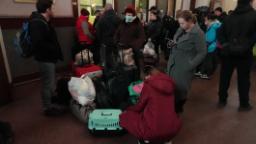
Lviv, Ukraine (CNN)At the railway station in Lviv, in Ukraine’s westernmost corner, near the Polish border, hundreds of people are pouring off of trains, disembarking as sirens blare.
The terminal, one of the most historic Art Nouveau structures in Europe, is now a waypoint for those displaced by war, attempting to put hundreds of miles between themselves and an invading Russia, while edging closer to NATO’s front line.
That the historic cultural hub could become a target for Moscow was unthinkable for many — including the diplomats and international organizations that fled from the Ukrainian capital, Kyiv, to Lviv in recent weeks.
But when the sirens went off, it was a chilling reminder that nowhere in Ukraine is safe from Moscow’s full-fledged assault on the country.
There was a faraway look in people’s faces. Most moved listlessly in the courtyard outside the station, even as the sirens sounded.
A family piled blankets over their baby in a stroller. Two women dressed a shivering French bulldog in a knitted pink sweater. Several other families sat together barricaded by large suitcases and plastic bags. They said they hadn’t slept for days because of the bombardment that has wracked the regions they left.
They had traveled to Lviv from cities and towns across the country, quickly packing backpacks and gathering a few belongings before fleeing their homes.
Still reeling from the violence, many say they don’t know where to go next. It’s a question that’s been complicated by a new Ukrainian martial law that’s been rolled out. Among other restrictions, it prohibits men between the ages of 18 and 60 from leaving the country.
Families considering crossing Ukraine’s border must contend not only with the trauma of becoming refugees, but also with the prospect of separating from their sons, brothers, husbands and partners.
Artem Zonenko just arrived in Lviv from Kyiv along with his mother-in-law and his infant daughter. They spent last night sleeping on the floor of a subway station, taking cover from the bombardment and shelling of the Ukrainian capital. His wife had been in Lviv for a few days. The family plans to spend a day together before they decide on whether grandmother, mother and child continue to Poland, leaving Zonenko behind.
Asked how he felt about it, he smiled despairingly. “I’m not sure what to tell you. It is what it is,” he said, corralling his family into a taxi.
The UNHCR said that at least 100,000 people left their homes in the first 24 hours of the military assault on Thursday. State-owned media and an eyewitness said over 7,000 cars queued up at crossings on the Polish border, with one line stretching for over 30 kilometers.
Andrei, 45, looked into the distance as he took a long drag from his cigarette. He just arrived from his native Odessa, in the southeast, and was concocting a plan to meet his Belarusian wife in Poland. “She’s pregnant. I need to go to her,” he said, refusing to disclose his full name for security reasons. “This law makes no sense.”
The government announced the general mobilization order — which included the male travel ban — while he was on the train. It is a curve ball that could upend his family’s future, he said. “And then [we] got off the train and the sirens went off,” he said. “I was shocked, because we weren’t even told where to take cover. I was shocked because this place is supposed to be safe.”
“And now we’re being told that we can’t even leave the country, while the migrants can,” he gestured to a group of foreigners nearby. “I ask you, is this fair?”
For migrants arriving in Lviv, their destination is certain — Poland, or any neighboring state that will take them in.
“I don’t know where to take cover because nowhere is safe,” says Mehmet, a Turkish resident in Ukraine, dragging two large suitcases across the pavement as the sirens sounded. “We’re just going to get out of the country.”
A group of Algerian university students who came from Odessa were frantically discussing their plans. “We’ll just go to Poland,” said Takieddine, who asked not to be named in full for security reasons. “There’s no way we’re staying in Ukraine.”
“We never thought this would happen in Europe. Never ever. Not in a million years.”
Ihor Nakonechyi, 52, is in the border town of Mostyska making preparations to shuttle his ex-wife and daughter to Poland. He plans to drop them off at the nearby crossing and then turn back, not just because the law prohibits him from leaving the country, he says, but because he “can’t wait to pick up a gun” and join the fight against Russian forces.
“It’s difficult … but I’m not bothered by the law. In fact I think this is the right thing to do.”
Journalist Roman Tymotsko contributed to this report.
Add Comment